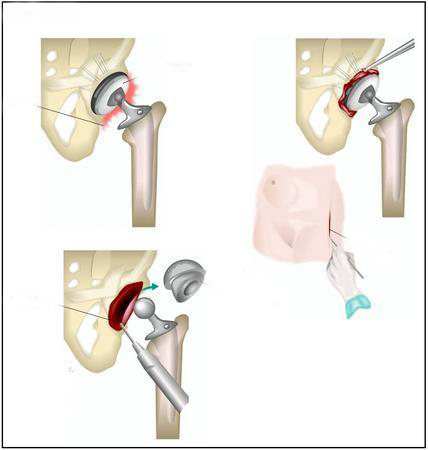

Total hip replacement is one of the most successful procedures in all of medicine. In the vast majority of cases, total hip replacement enables people to live more active lives without debilitating hip pain. Over time, however, a hip replacement can fail for a variety of reasons.
When this occurs, your doctor may recommend that you have a second operation to remove some or all of the parts of the original prosthesis and replace them with new ones. This procedure is called revision total hip replacement.
Hip revision surgery is performed to repair an artificial hip joint (prosthesis) that has been damaged over time due to an infection, or due to normal wear and tear of the prosthetic hip. Revision surgery helps to correct the problem so the hip can function normally again.

The use of artificial hip implants is extremely effective in improving hip joints that are damaged by injury or some form of arthritis. Artificial joints, including hip joints, do not last forever. The typical life of an artificial hip joint is 10-15 years, depending on the patient’s daily use of the joint. Patients with artificial hip joints are typically over the age of 55 and have developed severe arthritis in the hip. After a period of normal wear and tear of the hip joint, the prosthesis does not fit as securely and is not as effective. In these cases, hip revision surgery may be recommended by your doctor.
Revision surgery may also be recommended if an infection has developed in the tissue surrounding the joint. If infected, the muscle, tendon and ligament tissues in the hip joint will become weakened and damaged. The infection will also damage the hip bone.
Relief from pain is the main benefit of having hip revision surgery. Many patients may find that hip revision surgery improves mobility, strength and coordination of the torso and leg, in addition to improving the appearance of the hip and leg. Revision surgery may enable patients to return once again to normal activity with a pain-free hip. But keep in mind that successful hip revision surgery is also contingent on the patient’s diligence with his or her rehabilitation program following surgery.
Keep in mind that hip revision surgery is a voluntary, but safe procedure. Unforeseen complications may develop that are associated with anesthesia, such as respiratory or cardiac malfunction. In addition, complications may arise with an infection, injury to nerves and blood vessels, fracture, weakness, stiffness or instability of the joint, pain, or the possibility of needing more hip surgeries.


joint replacement surgeon in Indore | Best knee replacement surgeon in Indore | Knee specialist in Indore | Orthopedic surgeon in Indore | Doctor for knee pain in Indore | Hip replacement surgeon in Indore | Knee transplant surgeon in Indore | Knee replacement surgery cost in Indore | Knee replacement surgeon in MP | Shoulder replacement surgeon in Indore | Best robotic joint replacement surgeon in MP | Robotic joint replacement surgeon in Indore | Robotic joint replacement surgery in Indore | Robotic knee replacement surgeon in MP